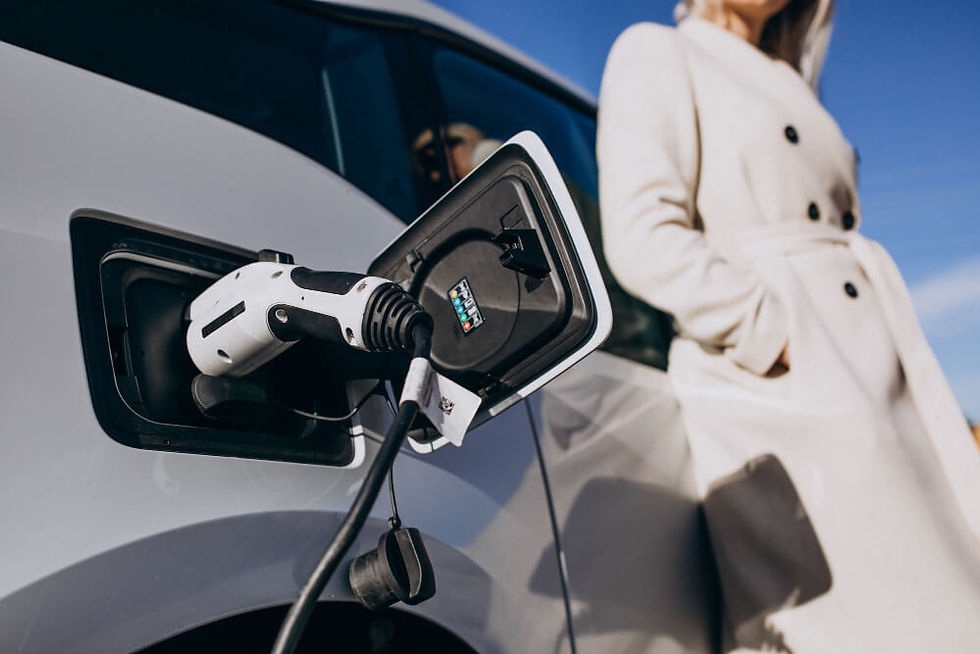Could Nanotechnology Make EV Charging Even Faster?
- Social Media
- Mar 5
- 3 min read
Imagine pulling up to a charging station, plugging in your EV, and within minutes, your battery is fully charged. No long waits, no range anxiety.
While fast charging has improved, it still doesn’t match the convenience of refueling a gas car. But what if nanotechnology could change that? Could microscopic materials revolutionize the way EVs are charged?
For an EV charging station business, advancements in battery technology could mean shorter wait times, increased efficiency, and a better user experience. Let’s explore how nanotechnology might reshape the future of charging.
What Is Nanotechnology & How Could It Help EV Charging?
Nanotechnology deals with materials at the atomic and molecular level, measured in nanometers—one-billionth of a meter.
In EV batteries, nanotechnology could:✅ Speed up energy transfer, reducing charging time✅ Prevent overheating, making fast charging safer✅ Extend battery lifespan by reducing wear and tear
For businesses operating EV charging stations, these advancements could lead to faster service times and increased customer turnover.
How Nanotechnology Could Improve EV Charging

1. Faster Charging Without Overheating
One of the biggest challenges in high-speed charging is heat buildup. When energy moves too quickly, it generates excessive heat, slowing down the process.
Nanomaterials could help by:
🔹 Enhancing battery cooling, preventing overheating
🔹 Increasing surface area, allowing for more efficient energy flow
🔹 Strengthening battery stability, reducing performance drops
For an EV charging station business, this means handling more vehicles per day with less downtime.
2. Smaller, More Efficient Batteries
Nanotechnology may lead to lighter, more compact batteries while maintaining or even increasing capacity.
This benefits both EV drivers and charging businesses:
🚗 EV owners enjoy longer range without increasing battery size
⚡ Charging stations experience faster turnaround times, leading to better efficiency
3. Extended Battery Life for Long-Term Performance
Frequent fast charging can degrade battery life over time. Nanomaterials might help prevent damage by making batteries more resilient, leading to:
✔️ Fewer battery replacements
✔️ Lower long-term maintenance costs
✔️ Increased reliability for EV charging station businesses
What This Means for EV Charging Businesses
If nanotechnology enables faster charging, EV charging station businesses could see:
📈 Higher demand – As EV adoption grows, more drivers will need reliable, fast charging solutions.
⚡ Greater efficiency – Faster charging means more vehicles served per day.
💰 Better profitability – Reduced charging time increases revenue potential.
🏆 Competitive advantage – Stations offering cutting-edge technology will attract more customers.
The shift toward nanotech-powered charging isn’t a question of if, but when.
Closing Remarks
Nanotechnology could be a game-changer for EV charging station businesses, enabling faster, safer, and more efficient charging. While widespread adoption may take time, the potential to make EVs more convenient than ever is on the horizon.
For now, EV drivers and businesses alike can look forward to a future where charging takes minutes—not hours.
FAQs
1. Will nanotechnology eliminate the need for charging stations?
No. Even with improved battery efficiency, drivers will still rely on EV charging station businesses, especially for long trips and urban areas where home charging isn’t an option.
2. Can faster charging harm EV batteries?
With current technology, repeated fast charging can reduce battery lifespan. However, nanotechnology could help minimize stress on the battery, making ultra-fast charging safer.
3. When will we see nanotechnology in EV charging?
The timeline is uncertain. While research is ongoing, its adoption will depend on industry advancements and infrastructure updates for EV charging station businesses.







Comments